Lemon juice vs. Lemon Concentrate: As a holistic nutrition specialist, I am frequently asked if it matters when choosing fresh juice vs concentrate for a healthy diet. It does! In this comprehensive guide, we will explore the merits of fresh lemon juice and its counterpart lemon juice concentrate. We'll compare their nutritional benefits and potential drawbacks in promoting overall well-being.
Jump to:
Lemons, with their vibrant flavor and invigorating aroma, have been revered for centuries. Whether used to elevate culinary creations or as a cleansing elixir in morning rituals, the allure of lemons extends far beyond their tangy taste.
However, when it comes to harnessing the maximum benefits from these citrus wonders, the decision between fresh lemon juice and lemon concentrate is an important one.
The short answer is: Fresh is always best. Fresh lemon juice, extracted directly from real lemons, is often celebrated for its authenticity, as it retains the full spectrum of nutrients and natural enzymes present in the fruit.
On the other hand, concentrated lemon juice, a convenient alternative derived from the evaporation of lemon juice, has gained popularity due to its longer shelf life and ease of use in modern kitchens. However, it commonly includes additives that are not good for health.
Benefits of Fresh Juice
Fresh cold-pressed lemon juice, obtained directly from the fruit, offers health benefits that extend far beyond its tangy flavor.
I firmly believe in the power of whole, unprocessed foods, and fresh lemon juice perfectly embodies this philosophy. In fact, it is one of my favorite health foods!
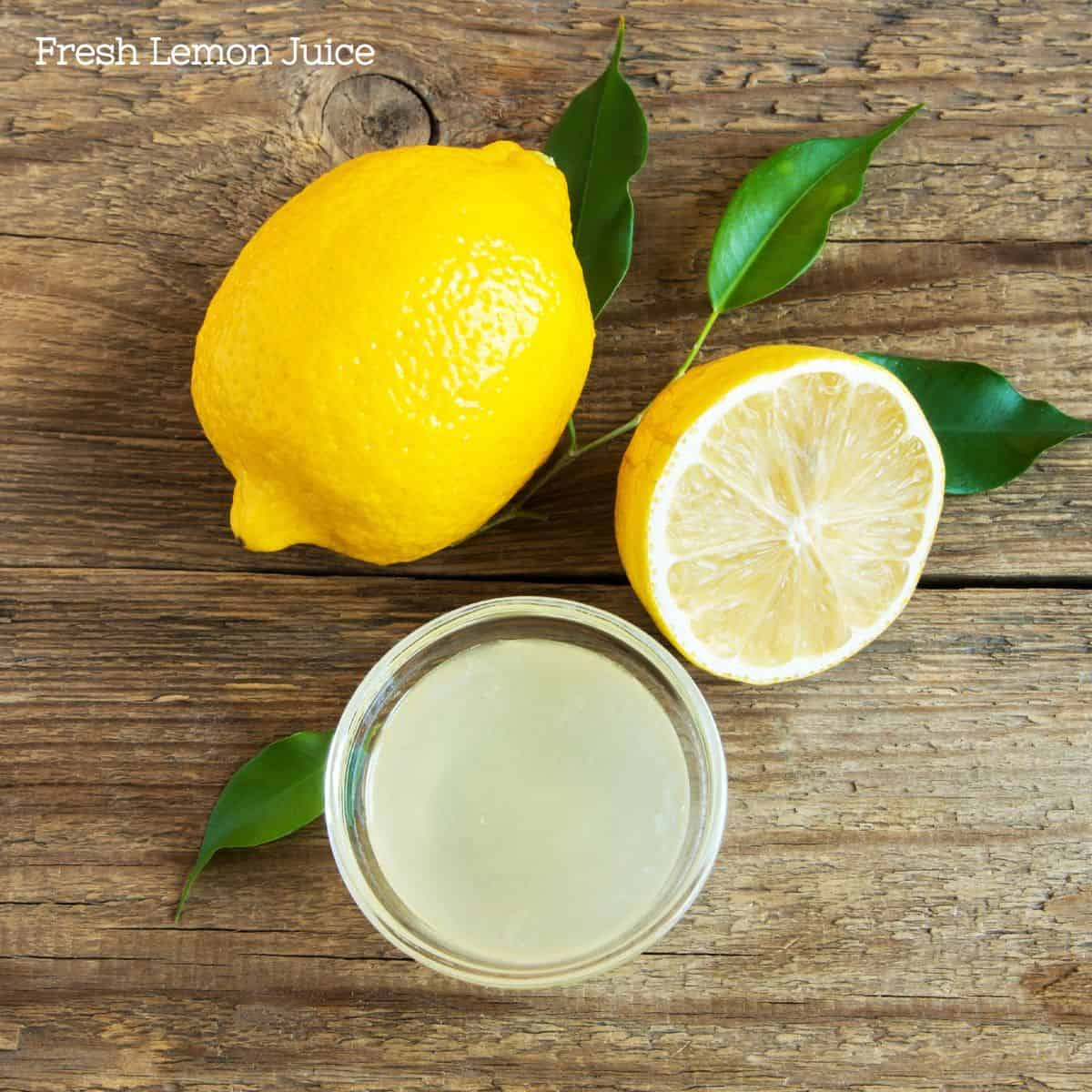
Abundant Vitamin C and Immune Support
Like most citrus fruits, pure lemon juice is renowned for its impressive vitamin C (Ascorbic Acid) content, a vital nutrient that plays a crucial role in strengthening the immune system. Vitamin C enhances the production and function of white blood cells, empowering the body to fend off infections and viruses more effectively.
Potent Antioxidant Properties
Freshly squeezed lemon contains an array of natural plant compounds called antioxidants, including flavonoids and limonoids, which help neutralize harmful free radicals in the body. By incorporating fresh lemon juice into your diet, you can bolster your antioxidant defenses and promote cellular health.
Alkalizing Effects and pH Balance
Despite their acidic taste, lemons have an alkalizing effect on the body once metabolized.
Drinking room temperature or warm water with fresh lemon juice first thing in the morning can help kickstart your day with a gentle alkaline boost.
This is the perfect addition to any healthy routine, but especially for those who wish to eat more cancer-fighting foods, as finding the right acid-alkaline balance with low-acid foods is important for fighting chronic illnesses.
Digestive Health and Detoxification
Lemons aid in breaking down food in the stomach, promoting smoother digestion. Additionally, lemon juice can stimulate the production of bile in the liver, aiding in fat metabolism.
This makes it an effective addition to any weight loss regimen. The fruit's natural cleansing properties also make it a popular choice for detoxification regimens.
Try our Energizing Lemon Turmeric Liver Cleanse Drink, Colon Cleanse Juice, or Anti-Inflammatory Juice Shot!
Skin Rejuvenation and Collagen Synthesis
Fresh lemon juice plays a vital role in collagen synthesis. Collagen is a protein that forms the building blocks of healthy skin, promoting elasticity and a youthful appearance.
Hydration and Electrolyte Balance
Staying adequately hydrated is essential for overall well-being, and fresh lemon juice can be a flavorful addition to your hydration routine. Lemons contain essential electrolytes like potassium, which help maintain the body's fluid balance and support nerve and muscle function.
Improved Energy
Lemon juice increases energy levels due to its high vitamin C content, which helps support iron absorption, enhances cellular energy production, and reduces feelings of fatigue, leaving you feeling revitalized and invigorated.
Natural Household Cleaner
Cleaning with lemon juice and its natural acids offers a double dose of benefits - the natural acidity of lemon juice helps break down grime and stains, while the inherent citric acid properties provide an eco-friendly and effective way to tackle household cleaning tasks.
In fact, it's an effective degreaser! Mixed with white vinegar and water, lemon, and other fresh citrus juices make an incredible natural household disinfectant spray! Citrus products are commonly used in many cleaners, but real fruit juice is the best!
What is Concentrated Juice?
Concentrated juice is a processed form of fruit juice that undergoes a reduction in water content to create a more concentrated liquid. In the case of concentrated lemon juice, the process involves extracting juice from fresh lemons and then removing a significant portion of its water content through evaporation.
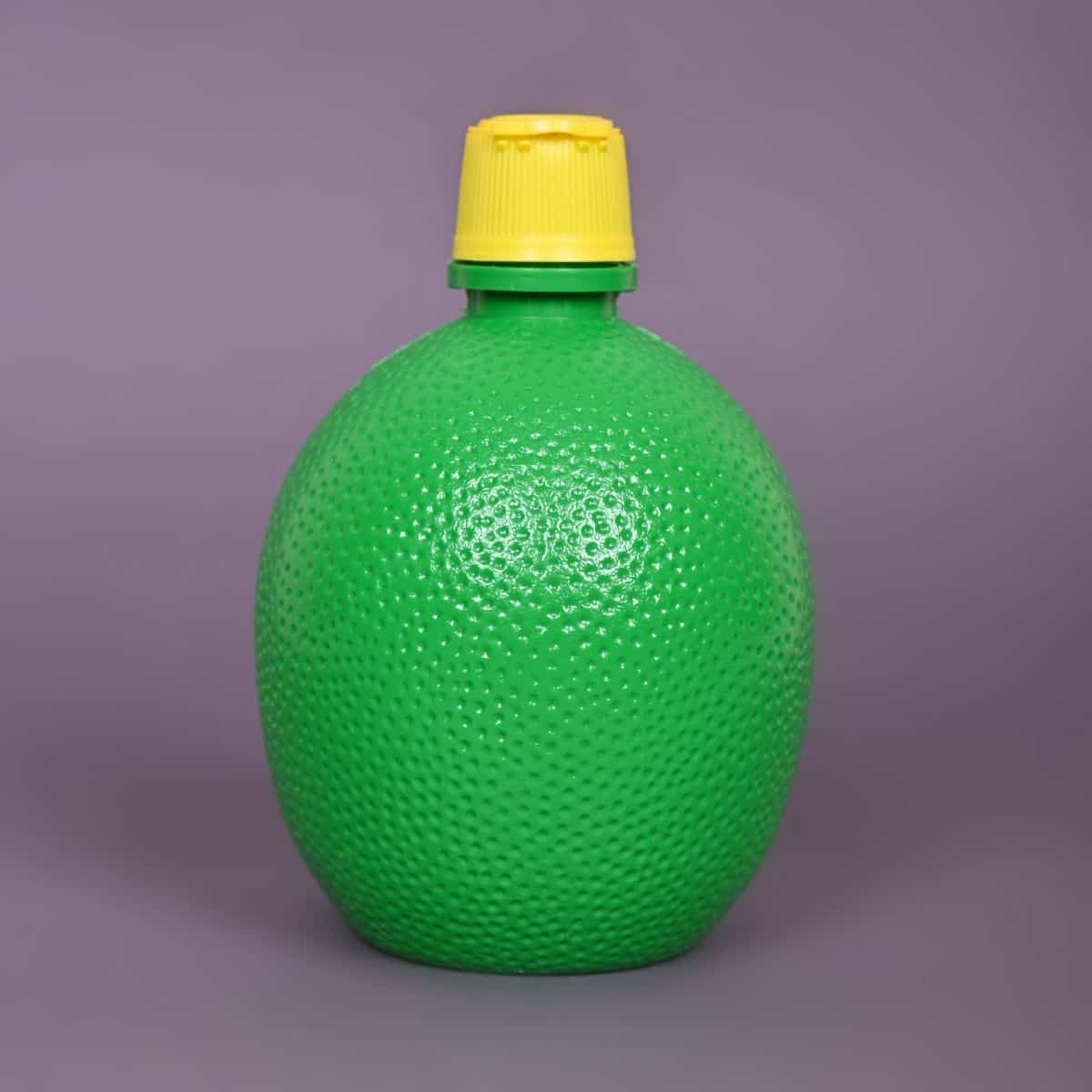
This evaporation process occurs under controlled conditions, reducing the volume of the juice while retaining the flavors and acids present in the original fruit. The concentrated form typically has a syrupy end product that needs to be dehydrated into a powder or rehydrated into reconstituted lemon juices.
The resulting concentrated lemon juice is then packaged and sold, often requiring dilution with water before consumption to restore its original liquid state and flavor intensity. It is typically either rehydrated and sold as bottled lemon juice or as a concentrated solution. Sometimes it is also sold in a lemon powder form intended to be added to water for convenience.
However, it's important to note that this concentration process may lead to some nutrient loss, including vitamin C, and some commercial products often contain added preservatives or sweeteners. Because of this, it is essential to be mindful of product labels and opt for organic, chemical-free options whenever possible.
Lemon Juice from Concentrate
When it comes to concentrated lemon juice, it's important to be cautious and selective, especially in regard to potential chemical additives and processing methods. While some organic, additive-free options may exist as a better option, it is crucial to prioritize the consumption of fresh homemade lemon juice for optimal health benefits.
Nutrient Loss and Additives
The concentration process of lemon juice can lead to the loss of essential nutrients, particularly vitamin C, due to exposure to heat treatment and prolonged storage. Additionally, some concentrated lemon juice products may contain chemical additives, preservatives, or sweeteners, which can diminish their nutritional value and may not align with a holistic approach to nutrition.
Emphasis on Freshness
Fresh lemon juice remains the preferred choice for promoting overall well-being. The act of squeezing fresh lemons not only ensures higher vitamin C content but also retains vital enzymes and antioxidants that contribute to better health. Plus its quick too!
The authentic flavor and nutritional integrity of fresh lemon juice make it a valuable addition to a balanced diet.
Minimal Processing and Maximum Benefits
Most lemon juices are poorly processed with chemicals during the concentration process.
Opting for organic and additive-free concentrated lemon juice may mitigate some concerns, but nothing compares to the natural richness and wholesomeness of freshly squeezed lemon juice.
By using fresh lemons, you can avoid potential chemical exposure and fully embrace the health benefits that nature provides.
Mindful and Sustainable Choices
Choosing fresh lemons over concentrated juice aligns with a holistic and sustainable approach to nutrition. Supporting local agriculture and consuming whole, unprocessed foods fosters a deeper connection with nature and nourishes both your body and the environment.
By savoring the vibrant taste and nutritional advantages of freshly squeezed lemons, you can make a conscious choice for your health, well-being, and the planet.
Embrace the natural goodness that fresh lemons offer and enjoy the full range of benefits they provide in their unadulterated form.
Lemon Oil
Essential oils, including lemon oil, are highly concentrated plant extracts known for their potent aroma and therapeutic properties.
Lemon oil is extracted from the peels of lemons through a process known as cold-pressing, which ensures that the oil retains its natural fragrance and beneficial compounds. In fact, it is for concentrated that 1 drop is equal to blending two whole lemons!
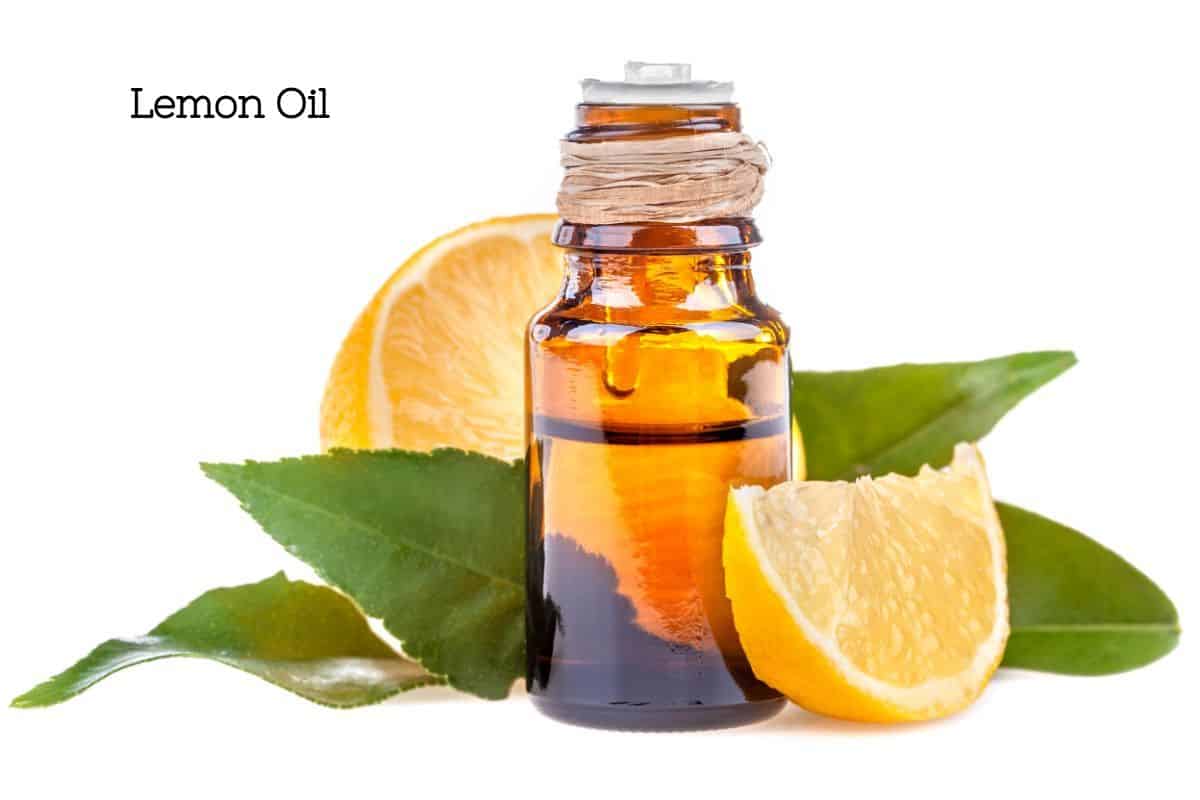
How Lemon Oil is Made
Harvesting: The process begins with carefully selecting ripe and healthy lemons. Organic lemons are often preferred to avoid potential pesticide residues in the oil.
Cold-Pressing: The lemon peels are then cold-pressed, which involves mechanically crushing the peels to release the essential oil. Cold-pressing is a gentle method that preserves the oil's integrity. It also prevents the breakdown of its natural components due to excessive heat.
Separation: After pressing, the essential oil is separated from the remaining liquid components, such as juice and water.
Filtration: To ensure purity and remove any impurities, the lemon oil undergoes a filtration process.
Bottling: The final step involves bottling pure lemon oil, ready to be used for various applications.
Lemon oil is prized for its invigorating and refreshing scent, making it a popular choice in aromatherapy and home fragrance. Its antimicrobial properties also make it a common ingredient in natural cleaning products.
The benefits of lemon oil include its ability to uplift moods and promote relaxation, and natural cleaning applications.
However, it's crucial to use essential oils, including lemon oil, with care and proper dilution. Their concentrated nature can cause skin irritation or sensitivity when applied directly to the skin.
As with any essential oil, it's advisable to consult with a qualified aromatherapist or healthcare professional before incorporating lemon oil into your wellness routine.
 Plant Therapy Organic Lemon...Shop on Amazon
Plant Therapy Organic Lemon...Shop on Amazon
Comparing Nutrition Facts
Here's a table comparing the nutritional content of fresh lemon juice with two forms of lemon concentrate: frozen concentrated lemon juice and bottled lemon juice concentrate. Please note that the nutritional values may vary based on brands and processing methods.
| Nutritional Components (per 100g) | Fresh Lemon Juice | Frozen Concentrated Lemon Juice | Bottled Lemon Juice Concentrate |
|---|---|---|---|
| Calories | 29 kcal | 238 kcal | 30 kcal |
| Carbohydrates | 9.32g | 59.41g | 8.71g |
| Sugars | 2.5g | 49.7g | 2.5g |
| Dietary Fiber | 0.3g | 0g | 0g |
| Protein | 0.4g | 1.2g | 0.5g |
| Fat | 0.3g | 0.9g | 0.2g |
| Vitamin C (Ascorbic Acid) | 38.7mg | 30mg | 3.5mg |
| Calcium | 6mg | 12mg | 5mg |
| Iron | 0.6mg | 0.2mg | 0.4mg |
| Magnesium | 6mg | 6mg | 5mg |
| Potassium | 103mg | 90mg | 96mg |
Please note that frozen concentrated lemon juice may have a higher calorie content due to its reduced water content.
It also contains more carbohydrates and sugars than both fresh lemon juice and bottled lemon juice concentrate.
Additionally, fresh lemon juice typically retains a higher vitamin C content compared to the concentrated forms.
It's important to consider the overall nutritional profile and potential additives when choosing between fresh lemon juice and different forms of lemon concentrate for your specific dietary needs and preferences.
Methods to Juice Lemons
Juicing lemons can be a simple and rewarding process. It provides you with a fresh, zesty flavor to enhance various dishes and drinks.
There are several methods to juice lemons, each with its benefits and convenience.
Additionally, prepping and storing lemon juice ahead of time can save you time and effort.
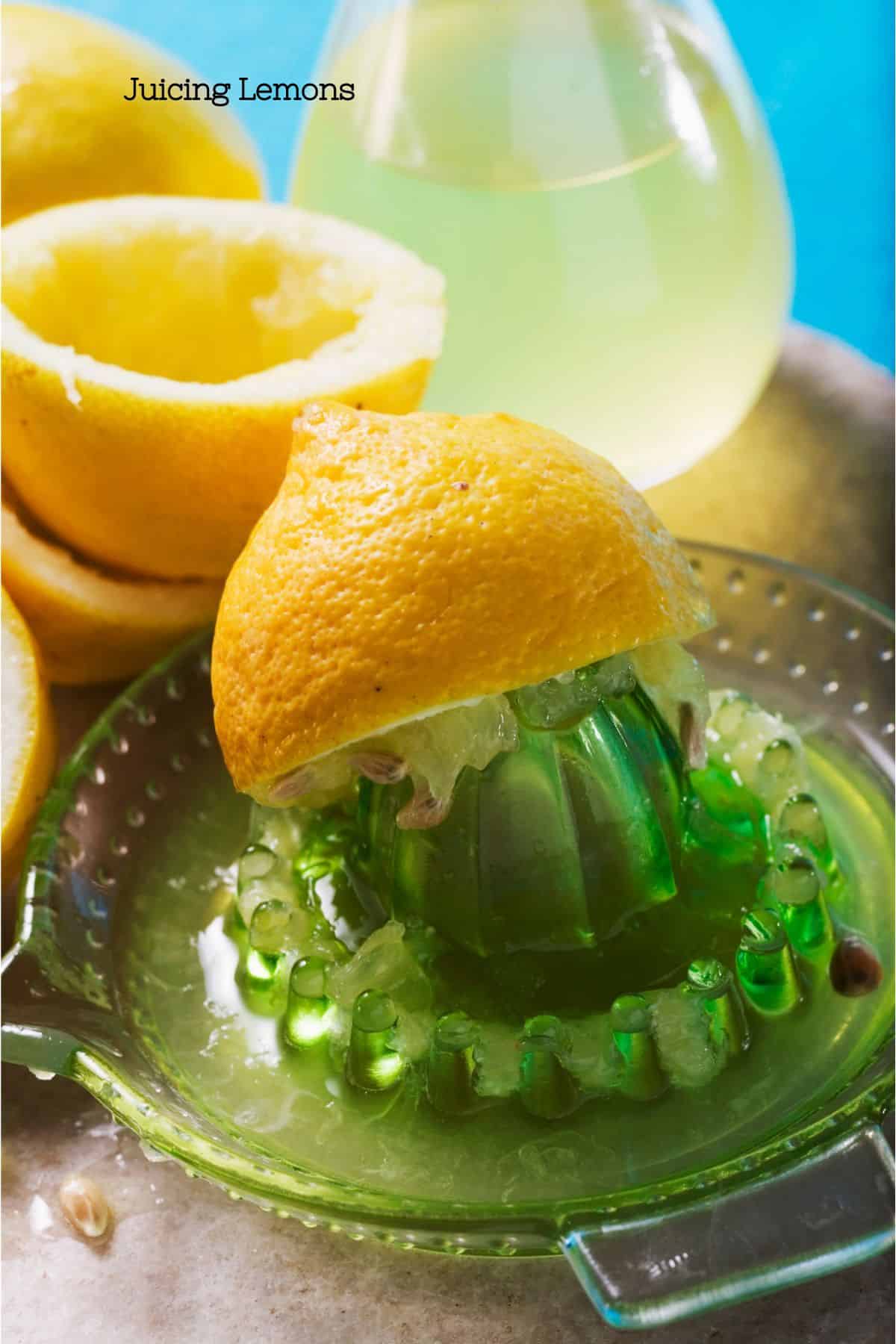
Manual Juicing
The classic method involves using a handheld citrus juicer or reamer to extract the juice from fresh lemons. This hands-on approach allows you to control the amount of pressure, yielding a good amount of juice while minimizing bitterness. Manual juicing is quick and effective for juicing a few lemons at a time.
 OXO Good Grips 2-in-1 Citru...Shop on Amazon
OXO Good Grips 2-in-1 Citru...Shop on Amazon
Electric Citrus Juicer
For those who frequently juice lemons or other citrus fruits, investing in an electric citrus juicer can be a game-changer.
These appliances efficiently extract juice from the fruits with minimal effort. This makes the process faster and more convenient, especially when juicing larger quantities.
 Eurolux Die Cast Stainless ...Shop on Amazon
Eurolux Die Cast Stainless ...Shop on Amazon
Lemon Squeezer
A lemon squeezer or citrus press is another effective tool for juicing lemons. This handheld device allows you to squeeze the juice out of the fruit by applying pressure. This ensures that you get the most juice out of each lemon without much mess.
 Zulay Kitchen Lemon Squeeze...Shop on Amazon
Zulay Kitchen Lemon Squeeze...Shop on Amazon
Convenient Juice Storage Options
To maintain the freshness and flavor of freshly squeezed lemon juice for a longer period, consider these storage methods:
Freezing in Ice Cube Trays
One of the simplest ways to store lemon juice for future use is by freezing it in an ice cube tray. After juicing the lemons, pour the fresh juice into the compartments of an ice cube tray.
Once frozen, transfer the lemon juice cubes to a labeled freezer bag. These lemon juice cubes can be conveniently popped into recipes or beverages as needed.
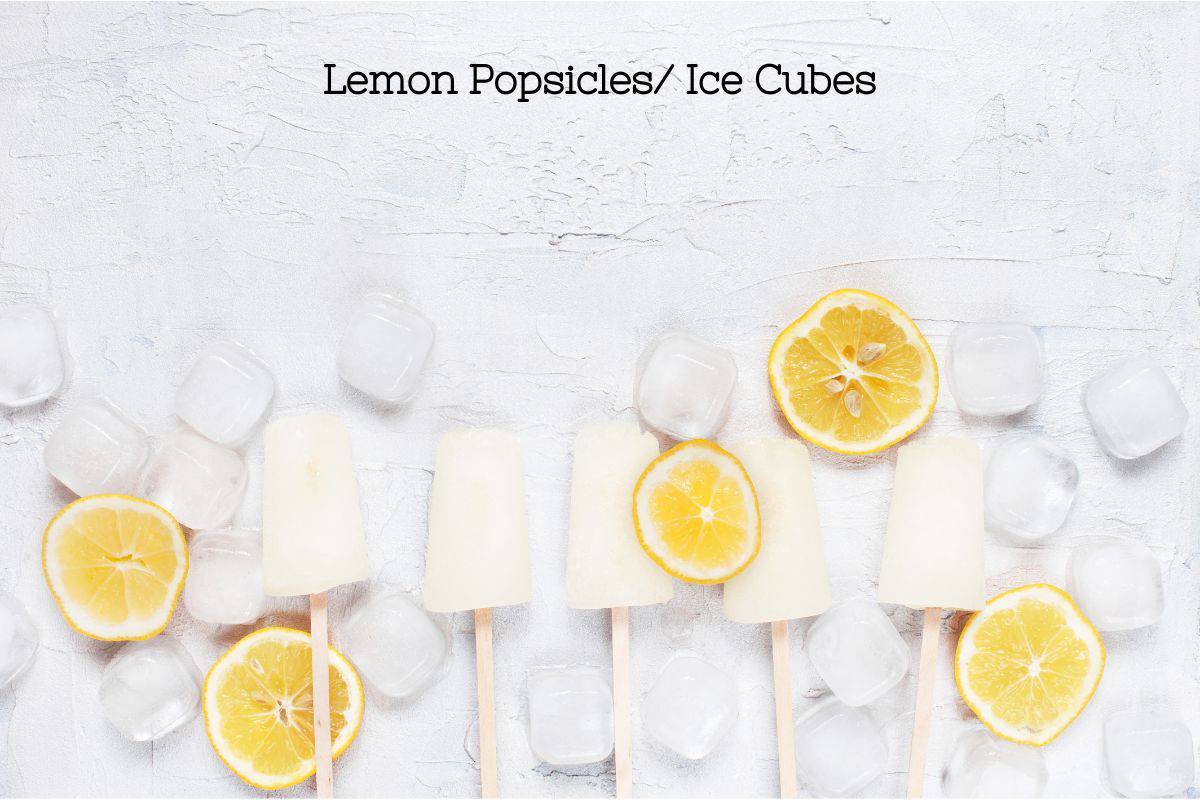
Airtight Mason Jars: For short-term storage, you can store freshly squeezed lemon juice in airtight mason jars in the refrigerator.
Make sure to fill the jars to the brim to minimize exposure to air. Exposure to the air can cause oxidation and affect the flavor of the juice.
Fresh lemon juice can be stored in airtight mason jars for up to 2 to 3 days before the nutrients begin to degrade.
Uses for Lemon Juice
Culinary
Lemon juice adds a burst of tangy flavor to various dishes, including salads, marinades, salad dressings, and seafood. It acts as a natural tenderizer and enhances the taste of both sweet and savory recipes.
Refreshing Beverages
A refreshing glass of lemonade or infused water with lemon juice is a classic way to beat the heat and stay hydrated while enjoying the benefits of its high levels of vitamin C.
Natural Cleaning Agent
The acidity of lemon juice makes it an effective natural cleaner. It can be used to remove stains, grime, and mineral deposits on surfaces like cutting boards, countertops, and faucets.
Deodorizer
The pleasant citrus scent of lemon juice can act as a natural deodorizer to eliminate odors in the kitchen, refrigerator, and even on hands after handling strong-smelling ingredients.
Skin Care
The vitamin C and antioxidant content of lemon juice can be beneficial for the skin. It may help brighten and even out skin tone, reduce the appearance of dark spots, and promote a healthy glow when applied topically or used in DIY face masks.
Hair Care
Lemon juice can be used to naturally lighten hair and add shine when applied as a rinse or mixed with other natural ingredients for hair treatments.
Flea and Insect Repellent
The scent of lemon juice can help deter fleas and certain insects, making it a natural and non-toxic option for pet care and home pest control.
Produce Preserver
The antibacterial properties of lemon juice can help prevent browning in fruits and vegetables like apples, avocados, and potatoes, preserving their freshness.
Nail Brightener
Applying lemon juice to nails can help brighten and whiten them, reducing the appearance of stains caused by nail polish or other pigmented products.
Natural Cough Remedy
A warm mixture of lemon juice and honey is a soothing home remedy for relieving sore throats and calming coughs. We recommend using Manuka Honey!
With its wide array of applications, lemon juice is a must-have ingredient that can enhance various aspects of daily life, from cooking and cleaning to beauty and natural remedies.
Conclusion
I encourage you to savor the goodness of fresh lemon juice whenever possible, relishing its rich nutrients and natural zest. However, I understand that convenience sometimes calls for alternatives like organic lemon concentrate without additives.
I'd love to hear your thoughts!
Drop a comment below and let me know your preference or any unique uses you've discovered for this versatile citrus gem.
For more culinary and wellness insights, consider subscribing to our newsletter and following us on social media for the latest updates. Together, let's embrace the goodness of lemons and elevate our well-being with mindful nutrition choices.
Have a healthy day!
Natalie


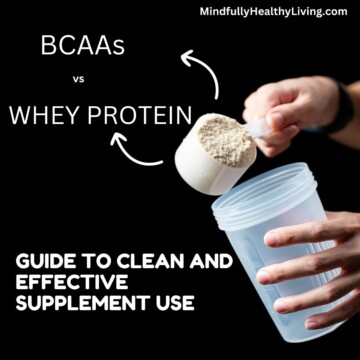
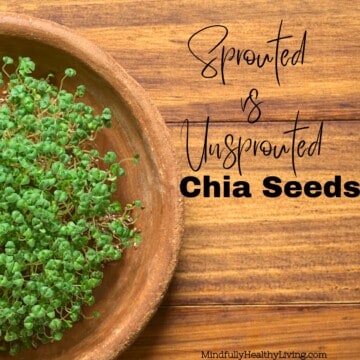
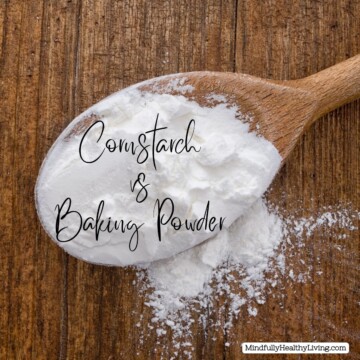
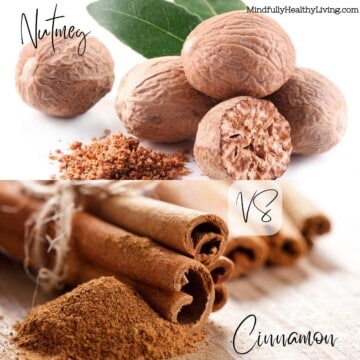
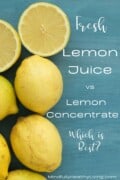
Susan French says
I’d rather use fresh lemons but besides being expensive hardly any juice comes out of them. I would prefer lemon juice concentrate for convenience but after reading your article it doesn’t seem like a good idea. I want to use it for a cleansing in the morning.
Natalie Perry says
I definitely understand! I use one lemon each morning with a hand juicer to mix in my lemon water cleanse drink! It works and is so worth it. Wishing you all the best 🙂